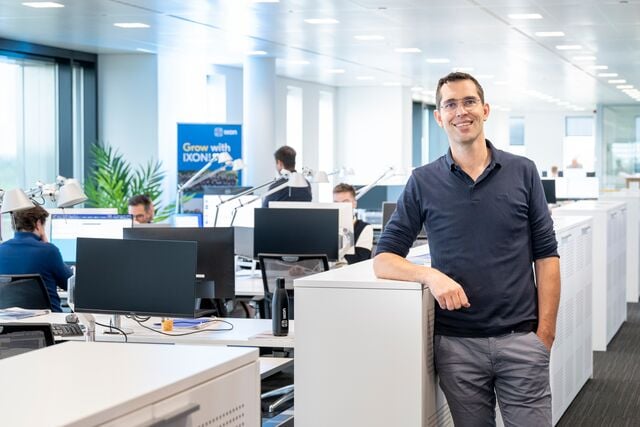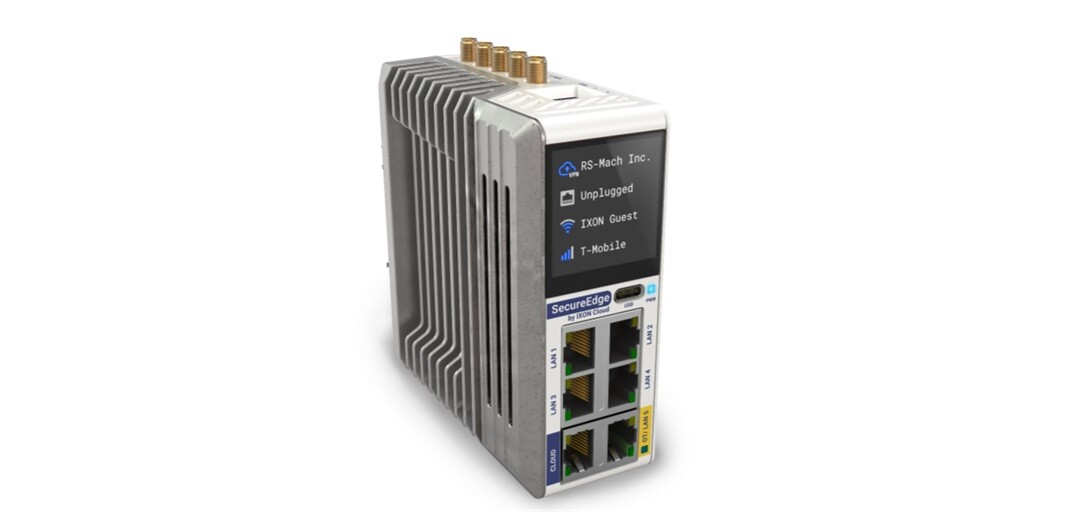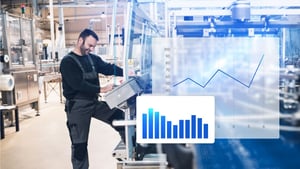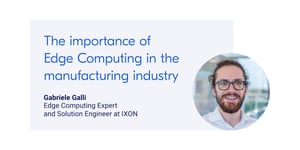In 2014, Willem Hofmans, an engineer specializing in software and electronics for machines, founded IXON. For the manufacturing industry, he developed one of the first industrial Iot platforms to connect machines to the cloud. "At the time, it was a complex and expensive process that required specialized IT skills, and we simplified it," says Hofmans.
We are now ten years on and IXON Cloud is one of the most popular IIoT platforms on the market. Headquartered in the Netherlands, 100 employees and revenues of around 15 million, 70,000 machines and 60,000 connected users. IXON, still 100% controlled by its CEO and founder, has one well-defined strategy: help machine builders make the most of industrial IoT data to improve after-sales service and create new digital business models as a service.

The platform allows machine data to be collected and stored in a secure cloud space covered by GDPR regulations. It allows for remote service and changes the way maintenance and service were performed until now. Condition monitoring, preventive and predictive maintenance and performance optimization.
"Every month we see a growing interest in our platform: OEMs have realized that digital condition monitoring and digital services are no longer an option, but a necessity. We support the market in this by providing concrete ideas and tangible solutions for a quick return on investment."
The following interview with the CEO and founder of IXON, was conducted by Industria Italiana.
What is your suggestion for those who aren't yet using an Industrial Iot platform and want to improve their business with digital services?
"Plan a long-term strategy that takes into account the opportunities that selling services presents," Hofmans says. "The best way is to start gradually, by putting together a project team with a mix of dedicated people, both inside and outside the company."
In recent years, IXON has grown significantly, but scaling up is always difficult. Have you ever thought about a co-participation of an investment fund?
"I have always been against the entry of an investment fund. We have a long-term vision and we believe that maintaining our independence will allow us to remain focused on our original mission: providing OEMs with the technologies to make after-sales service more efficient, allowing them to develop new business models based on servitization."
But given your numbers and the potential value of this market, you are in the crosshairs of possible takeovers…
"Offers have come in more than once in recent years, but I have always said no. If anything it could be the opposite, that IXON itself would make some kind of takeover. However, it's not a goal on the agenda."
Isn't going public on the stock market goal of yours?
"No, firstly because we are too small and secondly because we want to continue as we have been doing for the past ten years, maintaining a private dimension that allows us to be completely independent in our choices, without external pressure. We are growing very fast, profits and results are more than positive. It's a more than sustainable company and every year we take new staff on board."
Is the OEM market still largely dominated by a traditional approach or is the foundation for a real transformation of business models being laid?
"Machine builders are innovators and are constantly thinking about improving their machines. But the biggest challenge is to find solutions to generate revenue over the entire life cycle of the machine and no longer just at the point of sale. So we need to think of new ways to provide customer support by leveraging the potential of Industrial IoT. However, there are already many machine builders who have made the decision to invest in developing services with the aim of using their knowledge to optimize machines and advise customers on how to use them most efficiently."

How do you define your company?
"We are a supplier of hardware and software to OEMs, which has always been our only target market. And we are a strategic partner providing technology solutions to enhance our service offerings: the Industrial IoT platform and the edge computing gateway devices.
The integration between the two, software and hardware, is our strength. It's the combination of these two technologies that allows us to develop powerful, reliable and secure solutions. We sell hardware and software at the same time. Integration is also the key to a user-friendly solution."
So how does the machine builder market respond to your offer?
"Machine builders have the knowledge to make machines more efficient, but today this knowledge is not fully utilized. Selling a machine without connecting it subsequently means missing a business opportunity. To capitalize on these opportunities, many manufacturers are starting with condition monitoring, while remote access is now widely considered an indispensable service. Data analytics is now widely used. There is also increasing demand for integration with OT and IT systems, mainly ERP."
From what you have said so far, it seems that real servitization is still limited....
"For OEMs, servitization is a very long-term vision. Of course, I am still convinced that we will get there sooner or later. What we are aiming for right now is an overall improvement in service. Faster response times for solving problems or, in the most advanced cases, offering maintenance contracts based on service level agreements, which guarantee that problems will be solved within a certain period of time."
Servitization, is it a slower or faster phenomenon compared to your expectations?
"With customers we don't talk so much about servitization, the discussion is about how to improve customer service. This is the most important type of business today."
What is new and in which direction are you concentrating your investments?
"One of the key points is to continue to invest in enabling ever deeper integration with all business systems that revolve around the application dimension of Industrial IoT. And then making the data analysis and user interface increasingly attractive and enriching. Last but not least, security, which is becoming more important by the day. So having control over network traffic going from the edge to the cloud and vice versa. An example of this is the new SecureEdge Pro gateway that separates the factory network from the internet via a dedicated OT port."

The new SecureEdge Pro gateway
Can the platform be integrated with edge devices from other suppliers?
"Yes, it's developed based on industry standards and therefore it's possible to connect other devices. But in 90% of cases it's used integrated with our hardware. A solution that, as mentioned, is more secure and reliable. And much easier to implement."
What are the geographical areas of focus for your activities and what is the market context like?
"Our market is represented by Europe and the United States. From the manufacturers' point of view, 2024 is a year full of challenges. Global competition, especially from Asia, is going to be important."
Author - Piero Macrì from Industria Italiana





